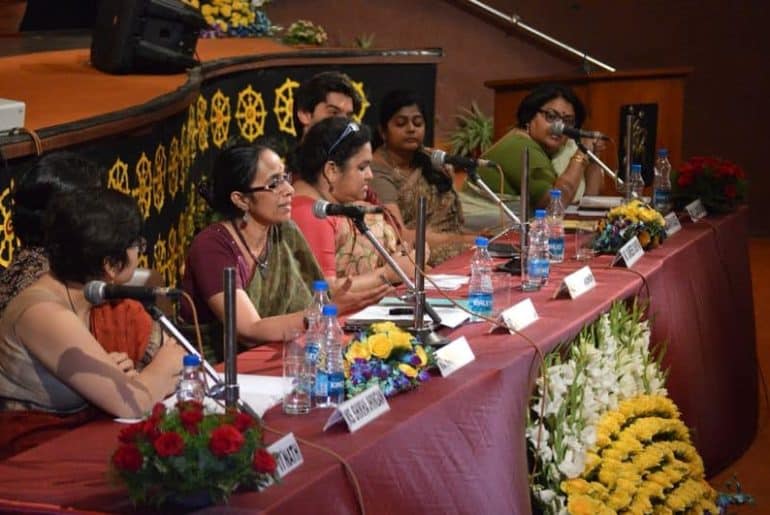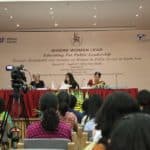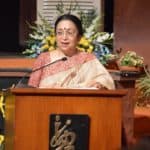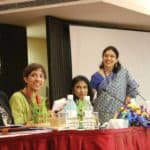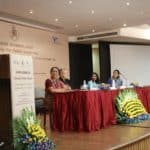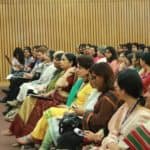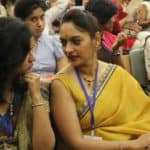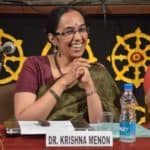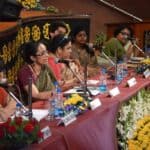Following the course of dialogue set by the Academic Congress on gender held earlier in the year, Lady Shri Ram College held a three-day conference from 31st march- 2nd April 2014- Where Women Lead, in association with the Women in Public Service Project, a global non-governmental initiative aiming to build a generation of women leader who would take responsibility to further the betterment of their countries.
The conference was held at the India International Centre and concluded at the college, it was supported by Ford Foundation India and the US Embassy. The conference saw educationists, policy makers, activists and performers all come together and interact with the students and the staff. The brainchild of college Principal Dr. Meenakshi Gopinath and Dr. Rangita De Silva De Alwis, head of the Global Women’s Leadership Initiative at the Wilson Center, the conference witnessed a total of 14 sessions as well as multiple film screenings and performances. The inaugural address was delivered by Nancy Powell, former US Ambassador to India, who spoke about how women’s issues were not just women’s issues but also those of family, economy, security and justice and that violence blocks the participation of women in society. Her message to the gathering was short and clear- we must do more.
The sessions on the opening day, focused on the importance of academic institutions in public leadership,which saw educationists from India, Sri Lanka and the United States talk about the role of women’s colleges. Foreign Secretary Sujatha Singh later addressed the delegates on what constitutes the private and the public and how these notions are highly gender-ed. The later sessions on law and rights hosted by acclaimed experts like Kamala Bhasin and Vrinda Groverhow talked about how human rights and women’s rights mean the same things and the importance of rights being accessible . Each session had a dedicated time slot for a Youth Speak round where the floor was open to questions and comments from the students.
The second day saw a series of dialogues unfold around democracy and equal (or unequal) participation, representation of women in politics and policy making, i.e., how it changes when women are at the helm. Aruna Roy, founder of MKSS, spoke about the need to go beyond voting and engage in alternative politics in order for women to exercise their rights as citizens, she also spoke about the big disconnect between formal leadership and the grassroots. Planning Commission member .Meanwhile, in a parallel session, women’s representation in top decision making bodies was discussed by a group of eminent party members from different South Asian countries. The day ended with the screening of Uma Chakravarti’s Fragments of a Past followed by a discussion with the filmmaker. An installation titled ‘Women in Movement’ was also showcased at the India International Centre on the first two days of the conference.
On the third day, all the sessions was held at the college itself; the day opened with the screening of an excerpt from Aung San Suu Kyi’s address to the college in November 2012. This was followed by a discussion by the faculty members on what leadership means to women and what happens when questions of caste, class and sexuality are woven into pre-existing gender imbalances. At the end of the session, it was clear that a feminist interpretation of leadership means collective leadership and this was reiterated by Dr. Gopinath in her closing speech when she quoted from Heider’s Tao of Leadership,” like water, the leader is yielding. Because the leader does not push, the group does not resent or resist.”
After the screening of the critically acclaimed film Girl Rising, the faculty and the students split into two different venues where each group, after over an hour of deliberation, arrived at action plans at various levels. These plans were read out and adopted as a declaration and a similar conference is soon hoped to be convened in order to implement the plan and track the progress made. The evening ended with moving closing comments and Kaleidoscope- a series of evoking recitations and performances. Through the conference, the college and especially its students hope to bring forward women’s leadership which, as put by Hillary Clinton, remains the unfinished business of the 21st century.
Photo Credits: Sahiba Chawdhary, DU Beat

